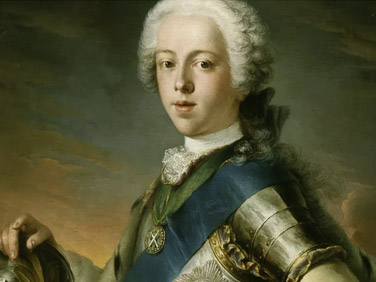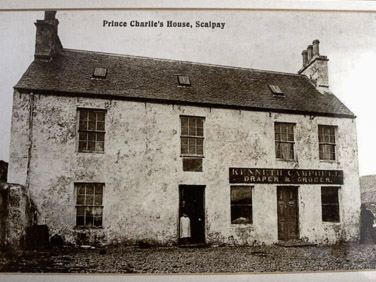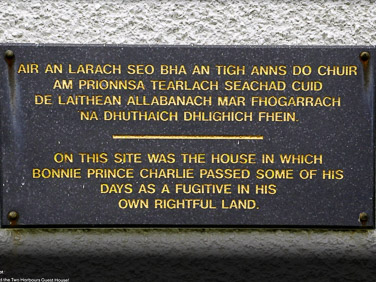HOUSE OF HISTORICAL NOTE

Bonnie Prince Charlie
Bonnie Prince Charlie spent four days at the house on this site from 30th of April 1746
while making his escape to France following his army's defeat at the battle of Culloden.
[Portrait of Prince Charles Edward Stuart 1739 by Louis Gabriel Blanchet (Royal Collection Trust).]

Two Harbours in the 1880's
This house was built incorporating the ruins and foundations of the original farmstead which in the mid 1700's belonged to Donald Campbell who was installed as a tacksman on Scalpay by the Macleod chieftans. The building pictured (our current guest house) was rebuilt in the 1880's when it became a Drapers and Grocers, then a Church Manse and more recently Two Harbours Guest House.

Commemorative Plaque
On this site was the house in which Bonnie Prince Charlie passed some of his days
as a fugitive in his own rightful land.
This historical house has a history of being an ‘open house’ serving people’s needs with traditional Hebridean hospitality
This house of historical note has solid granite walls and was built incorporating the ruins and foundations of the original farmstead which in the mid 1700’s belonged to Donald Campbell who was installed as a steward, or tacksman on Scalpay by the Macleod Chieftains (at a time when Highland and Island property was under clan-controlled ownership) to oversee and protect their deer forest on lands in North Harris. It was then the main farmstead on the island of Scalpay built in a prominent position between the two harbours (North and South). The building that stands here today was rebuilt in the 1880s when it became a Drapers & Grocers, then a Church Manse and more recently Two Harbours Guest House.
Donald Campbell’s farmhouse is historically documented for offering a safe house and hospitality to the fugitive ‘Bonnie Prince Charlie’ (the Young Pretender) and a few of his trusted lieutenants who had fled to the Outer Hebrides to avoid capture following the Jacobite’s defeat at the battle of Culloden on 16th of April 1746. The Young Pretender was in a perilous position, guards were posted at every ferry port, no one could get in or out without a passport, redcoats swarmed the islands and the sea-lochs and channels around the Hebrides were surrounded on both sides by Government ships (cutters, frigates and 40 gunships). Not least local bounty hunters were on the lookout to claim the significant reward on offer from the Hanoverian Government (£30 000) for his capture. When the Prince and his party arrived from Benbecula by rowing boat at dawn on 30th of April 1746 at Donald’s farmhouse on Scalpay they had disguised themselves as a shipwrecked merchant crew (the Prince going by the name of Sinclair), but Donald and his wife were under no illusion as to who their visitors were.
Donald had many reasons not to help this hunted, helpless fugitive standing cold, tired, and hungry on his doorstep. Donald was known to be strictly loyal to the Hanoverian crown rather than this political foe. He was also aware of the sizeable bounty on his visitor’s head and not least aware of the risk of brutal retribution from the Government for harbouring fugitives. Donald is an eternal tribute to the nobility of Hebridean hospitality and nature since he chose to risk everything and treat his visitors as he would any other guests offering his house and traditional Hebridean hospitality over politics, personal safety or reward providing the Prince and his men with a warm fire, beds, food, shelter, and the use of his boat. He even saw off a local Harris minister who arrived with henchmen to claim the bounty (offering Donald a cut) declaring “he came to me for safety, so how can I betray him”. The Prince and his party stayed for four nights at this site awaiting a boat being secured in Stornoway for his planned escape to France. Immediately following the Prince’s departure from Scalpay (on the 4th of May 1746) Donald had to go into hiding for it had become known that he gave refuge to the Prince, and this was a treasonable action in the eyes of the Hanoverian Government. Aided by Donald’s hospitality protection and discretion the Prince finally made good his escape to Rome via France. Donald found life increasingly difficult as a tenant farmer to the Clan Chiefs and eventually emigrated with his family to the North Carolinas leaving his farm to be run by his son.
This house has a history of being an ‘open house’ serving people’s needs with traditional Hebridean hospitality and it is in the same spirit that we would like the opportunity to extend to you a warm Hebridean welcome to our guesthouse and hope your stay is both comfortable and enjoyable!